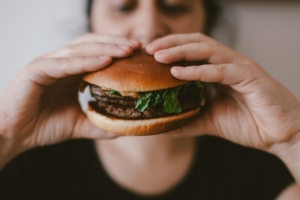6 Stress Eating Signs to Watch For
Stress eating is more common now than ever with the accessibility of so much food. In the past, when convenience, prepackaged, and fast foods did not exist, people had to farm or purchase fresh foods and prepare those foods before consumption. Now, reaching for a bowl of candy or a bag of pretzels for temporary stress relief is easy. We often do not think twice about it.
As many as 27% of adults turn to this practice, according to the American Psychological Association. Of the people who reported stress eating, a whopping 34% identified the behavior as a habit.
Are you concerned about stress eating?
 When we are stressed out, we eat mindlessly while not hungry. For example, you are up against a work deadline and know that you will not be able to pay your mortgage on time if you do not meet it. As the clock keeps ticking, you reach for candy or salty chips for temporary relief. When you meet the deadline, you feel a sudden surge of relief and decide to reward yourself with more food, such as ice cream.
When we are stressed out, we eat mindlessly while not hungry. For example, you are up against a work deadline and know that you will not be able to pay your mortgage on time if you do not meet it. As the clock keeps ticking, you reach for candy or salty chips for temporary relief. When you meet the deadline, you feel a sudden surge of relief and decide to reward yourself with more food, such as ice cream.
Also known as emotional eating, it becomes a habit, and the brain treats the behavior as a reward. However, like any bad habit, you can resist, break the habit, and form new ones if you first acknowledge the negative behavior. Newport Beach Christian Counseling can help guide you through this process, offering support and strategies for lasting change.
6 Stress Eating Signs
Are you unsure if you are engaging in stress-eating behavior?
The following are six stress eating signs to watch for. If these stress eating signs sound familiar, you can get help. Stress eating is a coping mechanism. Newport Beach Christian Counseling can help you find other ways to relieve stress without harming your health.
Rapid weight gain.
Due to the intake of unnecessary calories, you may gain weight if you partake in the habit frequently. Some foods contribute to chronic inflammation, which can cause weight gain and a “puffy” appearance. Pay close attention to the types of foods you reach for in stress-eating mode.
Intense urges to eat.
 When you are hungry, your stomach feels empty. Your stomach might growl, demanding food soon when you truly need it, and you will eat almost anything to nourish your body. However, stress eating operates on urges and impulses. The draw toward the food is almost tangible. The intensity grows, often for a specific type of food. When we give in to these cravings, we experience temporary stress relief.
When you are hungry, your stomach feels empty. Your stomach might growl, demanding food soon when you truly need it, and you will eat almost anything to nourish your body. However, stress eating operates on urges and impulses. The draw toward the food is almost tangible. The intensity grows, often for a specific type of food. When we give in to these cravings, we experience temporary stress relief.
Eating beyond full.
Stress eating is a behavior that happens mindlessly. When you consume high-fat or high-sodium foods, your brain rewards you with feel-good chemicals that temporarily relieve stress. Unfortunately, these fatty and salty foods can make it difficult to judge when your stomach is full.
When you eat while not hungry, the stomach does not send the same signal to the brain, alerting you that you are reaching fullness. Eating beyond full regularly can lead to digestive issues, stomach upset, and acid reflux.
Hiding your eating episodes.
Are you embarrassed by your stress-eating episodes? Do you hide the evidence? Do you feel ashamed when you count the wrappers tossed into the trashcan? If you hide your stress-eating episodes because of shame and guilt, reach out to a counselor for help. Eating should never make you feel shame. Hunger is a natural response, but the urges from stress eating can develop into a bad habit that can be broken.
 Yo-yo dieting.
Yo-yo dieting.
If stress eating is something that happens regularly, then you might also diet frequently. This yo-yo dieting (strict dieting followed by stress eating and then resumed dieting) does more harm than good. Many times, your body will crave avoided foods while stressed. It is better to live with an 80/20 mindset. Eat healthy 80% of the time and allow yourself treats 20% of the time. This might help diminish the yearning for “forbidden” foods.
Preoccupied with food.
Preoccupation with food is another sign. It is mentally unhealthy if you always seem worried about your next meal or snack, whether you can get what you want, especially if you are stressed. Note: this preoccupation with food stems from an overabundance and an obsession. If you do not have adequate food at home to feed you and your family, reach out for help.
Break the hold food has over you.
Has your stress eating become a habit? Are you experiencing the negative effects of emotional eating? Contact our office today to schedule a session with a counselor at Newport Beach Christian Counseling in California, who can help you take the proper steps to break free from it.
“Burger Time”, Courtesy of Szabo Viktor, Unsplash.com, CC0 License; “Burger Time”, Courtesy of Szabo Viktor, Unsplash.com, CC0 License; “Sandwich”, Courtesy of Haley Truong, Unsplash.com, CC0 License

 Eating disorders develop from a range of different areas. When a parent has an unhealthy relationship with food, this relationship can be passed down to their children. If your mom is constantly counting calories or obsessing about each morsel consumed, you might begin to imitate this as well. Whatever the case may be, eating disorders often run in families.
Eating disorders develop from a range of different areas. When a parent has an unhealthy relationship with food, this relationship can be passed down to their children. If your mom is constantly counting calories or obsessing about each morsel consumed, you might begin to imitate this as well. Whatever the case may be, eating disorders often run in families. If you know someone who has an eating disorder, you can educate yourself on the specific disorder, let your friend know you are there to support them and encourage them to make use of individual or family counseling.
If you know someone who has an eating disorder, you can educate yourself on the specific disorder, let your friend know you are there to support them and encourage them to make use of individual or family counseling. In a time of need, we need friends willing to do whatever it takes to see us get well. It’s important to surround yourself with a team of people who will walk alongside you during your recovery journey.
In a time of need, we need friends willing to do whatever it takes to see us get well. It’s important to surround yourself with a team of people who will walk alongside you during your recovery journey. God’s love is neverending. There’s nothing we can do to exhaust His love for us. It’s natural to drift away from God, to struggle to feel His presence or to forget His promises for our lives. Here are some scripture verses to meditate on during your recovery.
God’s love is neverending. There’s nothing we can do to exhaust His love for us. It’s natural to drift away from God, to struggle to feel His presence or to forget His promises for our lives. Here are some scripture verses to meditate on during your recovery.